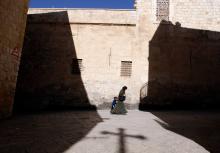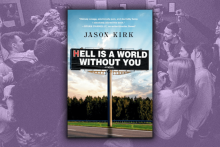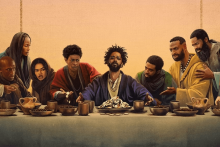Opinion

Earlier this year, I was arrested alongside more than a hundred other Mennonites in Washington, D.C., as we raised our voices in song, demanding that our elected officials call for a cease-fire in Gaza. Being a part of this act of peaceful civil disobedience, organized by Mennonite Action, gave me a sense of clarity about my faith that I had sought for years. As Capitol Police officers zip-tied my wrists behind my back, I sang louder and thought to myself: “This is what it means to be a Christian. This is what pacifism meant to my Mennonite ancestors.”

In Gaza, millions are being “overlooked or ignored.” Right now, people are starving and clinging to the fading hope that somehow territorial, historical, religious, and political crisis can yield to compassionate humanity. This, friends, represents our highest and most crucial calling. We are compelled by the teachings of Jesus to offer help — and we must act.

As a Palestinian Christian, I am proud to be a descendant of the world’s most ancient Christian community. My pride transcends the mere fact of belonging; it is rooted in the cultural legacy and global impact that our community has bestowed upon the world through nurturing and shaping Christianity from its earliest days until now. But this pride carries with it a solemn responsibility: I must be committed to preserving the integrity and values of this cultural and religious heritage, indigenous to my homeland, from being misappropriated to justify oppression, whether mine or someone else’s.

“Eating is an inherently good activity,” writes Elizabeth Palmberg in the 2009 issue of Sojourners, “a channel of God’s goodness.” Eating is also an essential way for us to experience fellowship, build relationships, and share love. Yet eating can also be, as the Apostle Paul writes, an extension of our faithfulness: “So whether you eat or drink or whatever you do, do it all for the glory of God” (I Corinthians 10:31). And when I think about my diet, it’s hard to imagine how the overconsumption of meat — which so often exacerbates health problems and disproportionately contributes to climate change — can be to the “glory of God.”

The new documentary God & Country, inspired by Katherine Stewart’s book The Power Worshippers, fortunately escapes most of the major pitfalls of political documentaries as it addresses the rise of Christian nationalism.

I don’t think I’ve ever read a book quite like Jason Kirk’s Hell Is a World Without You. This book, a bildungsroman about a teen’s evangelical house of cards and the mounting life experiences, new friends, and cold fingers of doubt that threaten to knock it over, is a call coming from firmly inside the house.

The greatest single line in cinema of the past 12 months was delivered inside of a Barbie Dreamhouse.

Every morning, I drive my two sons, ages 11 and 13, to school. Normally these rides are mostly quiet as I listen to podcasts, and they watch something on their iPads. But this February, I told my sons we were starting a new tradition: Taking turns naming a figure of Black history and sharing why we believe that person was significant. To my surprise, my sons’ initial reticence quickly turned to enthusiasm. So far, we’ve talked about Louis Armstrong, Jesse Owens, Sojourner Truth, Thurgood Marshall, Rosa Parks, and Carter G. Woodson — the leader of the Association for the Study of Negro Life and History who established the second week of February to be “Negro History Week” to counterbalance the ongoing erasure of Black contributions in the U.S.

It’s an election year again, and so far it sees that President Joe Biden and former President Donald J. Trump will again be on the ballot for the White House in 2024. For many churches, that means a repeat of 2020’s division, misinformation, and difficult decisions about corporate worship.
Buckle up.
We have been on this ride before, but that doesn’t mean it will be any easier.

On Sunday, I tuned in to watch my first football game in over a year as part of my discipline toward Christian nonviolence. That may seem odd, especially since I’m the person who wrote about quitting the NFL as an act of nonviolence just last year. But this weekend I tuned in for the NFL’s Pro Bowl competition, including the flag football game, to signal my support for player safety and wellbeing.

I’m a historian and a religious studies scholar who recently published a book exploring the role of religion in political movements such as anti-abortion campaigns. Historical evidence can help identify trends that will likely influence the mix of religion and politics in the year ahead.
From my perspective, three key trends are likely to show up in 2024.

Payne details the creation, proliferation, and decline of CCM, tracing the industry’s relationship with conservative evangelical Christianity.

This week the House voted with a resounding margin of 357 to 70 to pass a bill that includes support for low-income families with multiple children. If passed in the Senate, the “Tax Relief for American Families and Workers Act” will enhance the Child Tax Credit by expanding eligibility and adjusting payments for inflation, provisions that would benefit about 16 million children in families with low income, lifting 400,000 children above the poverty line.

As far as coming-of-age stories go, Percy Jackson and the Olympians, a new Disney+ streaming series, is certainly an earth-shattering one

More than 23 years after the box office hit Chicken Run came out, Aardman Animations has finally released a sequel: Chicken Run: Dawn of the Nugget is a punny, thrilling, and slightly disturbing homage to the art of claymation, with abundant lessons about collective liberation, trauma, and parenting.

In July of last year, an estimated 50,000 fans flooded Arrowhead Stadium in Kansas City to see Taylor Swift’s Eras Tour concert. Among those in the crowd was football tight end Travis Kelce, eager to woo Swift. Arrowhead has been central to Swift and Kelce’s romance ever since: After making their romance official last September, Swift has routinely joined the 76,000 Chiefs fans to cheer for Kelce and his teammates. From concertgoers to sports spectators, the thought of that many people in the same space is difficult to imagine. Equally hard to imagine, and significantly more heartbreaking, Israel Defense Forces have killed 25,000 Palestinians since Oct. 7, 2023; that number of people would fill about a third of Arrowhead Stadium.
This is a jarring image, but such is the reality of our present moment: While the state of Israel carries out a genocide against Palestinians, we are easily distracted by our adoration for Swift and Kelce, along with spectator sports.

In her support of Icke and Rowling, Walker seems to have lost sight of her own claims about God and humanity that are revealed in The Color Purple and other works.

The prevailing public narratives we have used to justify military strategies amid diplomatic fantasies are being exposed as meaningless: Unfettered Israeli military power can never impose a lasting solution nor quench Palestinian aspirations for sovereignty and justice. Likewise, Palestinian armed factions can never defeat Israel’s military power, backed by the unequivocal support of the U.S. These exclusionary self-vindicating visions dominate in a completely zero-sum game. Escalating violence wantonly kills, intensifying the compulsion to eradicate the human dignity of the “other.” In short, there is no military solution to the raging warfare spilling over our screens and tearing our hearts asunder.

On my first trip to Cuba in 2022, I met Jorge González Nuñez, president of the Movimiento Estudiantil Cristiano de Cuba (MEC). I asked how he would describe the situation the Cuban people were living in, impacted by the U.S.’ decades-old trade embargo and other policies introduced by the administrations of former President Donald Trump and President Joe Biden, from a theological perspective. His answer stuck with me.
“The Cuban people are going through a crucifixion,” he said without hesitation. “It is hard to have hope.”
He paused and then added, “But there is resurrection.”

Director Jeymes Samuel’s newest movie, The Book of Clarence, is not just a biblical epic but a Black biblical epic.